World champion Omar suspended for Anti-Doping violation
Egyptian athlete had won gold and set a world record in April 2014. 09 Dec 2014
The IPC will continue to educate athletes and their support staff on the importance of anti-doping.
The International Paralympic Committee (IPC) has announced that Egyptian world champion powerlifter Fatma Omar has been suspended and fined for an Anti-Doping Rule violation.
Omar returned an adverse analytical finding for Clomiphene in a urine sample provided on 8 April 2014 following her participation at the IPC Powerlifting World Championships in Dubai, UAE. This substance is included on the World Anti-Doping Agency (WADA) 2014 Prohibited List under the category S4. Hormone and Metabolic Modulators and is prohibited both in and out of competition.
As a result of her violation, Omar will be ineligible from competition for two years from 16 May 2014, the date the athlete was notified and provisionally suspended, until 15 May 2016 and has been fined EUR 1,500.
All Omar’s results obtained from the date of the test and onwards will be disqualified including forfeiture of any medals, points, records and prizes. This includes the gold medal she won on 8 April and world record she set in the women’s up to 61kg class at the 2014 IPC Powerlifting World Championships. As a result, Mexico’s Amalia Perez will now receive the gold, and the Chinese pair of Yan Yang and Jianjin Cui, the silver and bronze respectively.
The principle of strict liability applies to anti-doping matters. Therefore, each athlete is strictly liable for the substances found in his or her sample, and that an anti-doping rule violation occurs whenever a prohibited substance (or its metabolites or markers) is found in his or her bodily specimen, whether or not the athlete intentionally or unintentionally used a prohibited substance or was negligent or otherwise at fault.
As a signatory of the World Anti-Doping Code (WADC), the IPC remains committed to a doping free sporting environment at all levels. The IPC, together with the International Federations and the National Paralympic Committees, established the IPC Anti-Doping Code to prevent doping in sport for Paralympic athletes, in the spirit of fair play. The IPC Anti-Doping Code is in conformity with the general principles of the WADC.
In 2015, IPC Powerlifting will be continuing its Raise the Bar – Say No! to Doping campaign at every major competition with the aim of educating athletes and teams about anti-doping.

 Facebook
Facebook
 Instagram
Instagram
 Twitter
Twitter
 Youtube
Youtube
